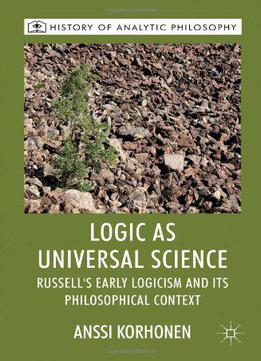
Logic As Universal Science: Russell's Early Logicism And Its Philosophical Context
by Anssi Korhonen /
2013 / English / PDF
2.3 MB Download
Bertrand Russell was a central figure in the rise of analytic philosophy, and there are few works in the genre whose influence is comparable to The Principles of Mathematics (1903), a book that established him as a major force in British philosophy. Logic as Universal Science takes a fresh look at the context of The Principles. This, it is argued, involves an extended argument against Kant's transcendental idealism and his conception of mathematics as a synthetic a priori science grounded in pure intuition. Philosophically, Russell's logicism substitutes pure logic for pure intuitions as the true source of mathematical knowledge. In this way, logic turns out to be a universal science and very far from Kant's general logic, which is a concise and dry science, delivering nothing but a purely formal criterion for knowledge. The picture of logic emerging from this opposition is investigated in detail for its content and consequences.











